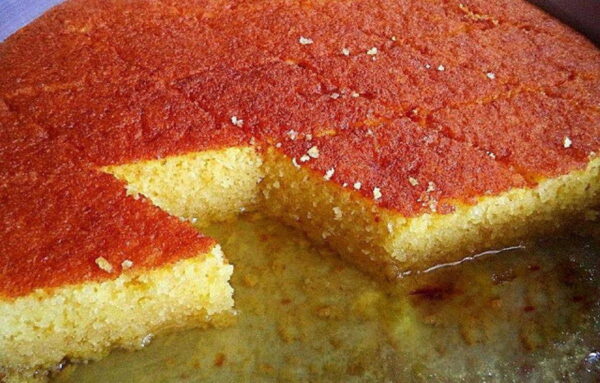What Is Ravani?
Ravani — also known as Revani in Turkey and across the Middle East — is a traditional Greek semolina cake soaked in syrup, celebrated for its golden colour, moist texture, and delicate citrus aroma. This beloved Mediterranean dessert beautifully bridges Eastern and Western culinary traditions, bringing together centuries of history in one fragrant, syrupy slice.
A Journey Through History: From Byzantium to Today
The origins of Ravani date back to the Byzantine era, when cooks blended semolina with honey or grape must to create early forms of syrupy confections. As centuries passed and the Ottoman Empire spread through the region, the dessert evolved — taking on local flavours and techniques.
In Greece, Ravani became a symbol of home baking and hospitality, flavoured with lemon, orange zest, or mastiha. In Turkey, Revani developed its signature floral notes with rose water and orange blossom syrup. Despite the regional differences, the heart of Ravani remains the same: a simple semolina sponge cake transformed into a rich, syrup-soaked delicacy.
Traditional Greek Ravani Recipe: The Art of Simplicity
What makes Ravani special is its simplicity and balance of flavours. The classic Greek recipe includes just a few basic ingredients:
-
Semolina (fine or medium grain) – for texture and structure
-
Flour – to lighten the crumb
-
Eggs – for richness and stability
-
Greek yoghurt or butter – to keep the cake moist
-
Citrus zest – for brightness and aroma
Once baked, the cake is generously soaked in a warm lemon or orange syrup made from sugar and water. The syrup infuses the semolina, creating a dessert that’s both light and indulgent — sweet but never cloying.
Tip: For best results, pour warm syrup over a slightly cooled cake so it absorbs evenly and stays moist.
Regional and Modern Variations
The beauty of Ravani lies in its adaptability. Every region — and often every family — adds its own twist:
-
Greek Ravani: Moist and airy, typically made with yoghurt and flavoured with citrus zest.
-
Turkish Revani: Often enriched with rose or orange-blossom syrup for a floral fragrance.
-
Middle Eastern Basbousa or Namoura: Denser versions made with coconut and sometimes topped with almonds.
-
Modern Variations: Health-conscious bakers use olive oil, honey syrup, or almond flour for gluten-free and lighter alternatives.
How to Serve and Enjoy Ravani
Ravani is best enjoyed slightly chilled, allowing the syrup to set and the flavours to harmonise. It pairs beautifully with:
-
Greek coffee
-
Mint tea
-
Or even a small glass of liqueur after a meal
In Greece, Ravani often graces Sunday tables and festive gatherings, symbolising sweetness, generosity, and the joy of sharing.
The Famous Revani of Veria: A Sweet Greek Trademark
One of the most celebrated versions of this dessert is the Revani of Veria, a culinary treasure from northern Greece. According to tradition, the dessert may have been named after the 16th-century Turkish poet Revani, known for his “sweet” culinary verses.
The story continues in 1886, when a man named Hochliouros began selling yoghurt and syrupy sweets from his dairy shop in Veria. He used a Turkish-inspired recipe passed down through generations — and this secret version eventually became the hallmark of the region.
The Veria Revani stands out for its perfect balance of coarse and fine semolina, rich sheep’s milk yoghurt, and warm, thick syrup scented with lemon. Locals often serve it with kaimaki ice cream or use it as a base for cream mousse or cheesecake, proving its versatility and timeless charm.
Why Ravani Remains a Mediterranean Classic
Ravani endures because it reflects the soul of Mediterranean cuisine — simple ingredients elevated through care, tradition, and balance. It embodies the region’s values of hospitality, community, and shared pleasure, connecting generations through the universal language of sweetness.
Whether you call it Ravani, Revani, or Basbousa, one thing is certain: this syrup-soaked semolina cake remains a delicious reminder of the Mediterranean’s rich culinary heritage — and a treat that will never go out of style.




